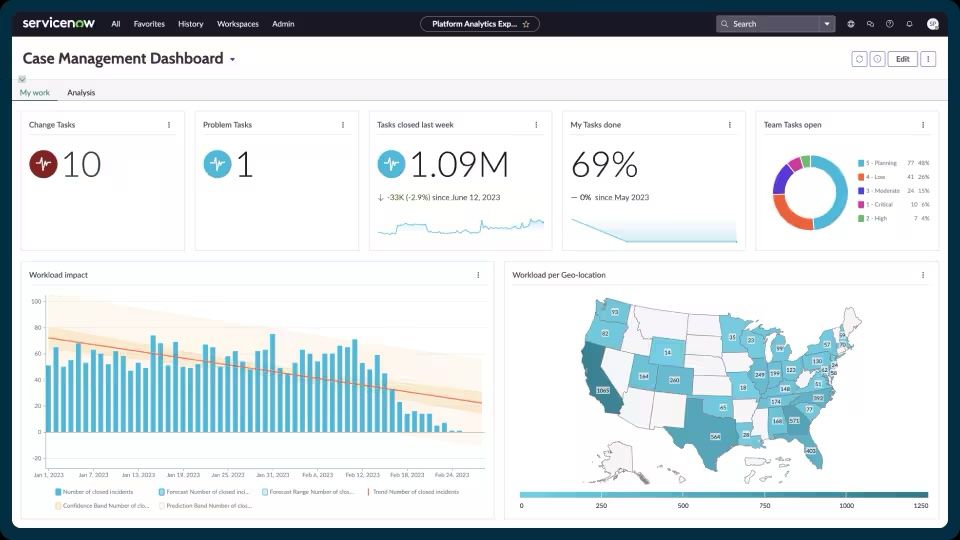ServiceNow: Automating the Modern Enterprise with AI-Powered Workflows

Want to invest in NOW?
Visit our How to Invest page to get started with platforms like Fidelity or Robinhood.
Artificial intelligence is everywhere — in headlines, apps, and boardrooms — but one company has quietly embedded AI deep into the heart of how modern businesses actually operate: ServiceNow (NYSE: NOW).
ServiceNow doesn’t just sell software. It helps large enterprises automate their work — resolving IT issues, streamlining HR tasks, optimizing service delivery, and more. And now, with generative AI woven directly into its platform, ServiceNow is doing what few others can: turning the promise of AI into real-world productivity.
In a market obsessed with front-end flash, ServiceNow is focused on what matters most — getting work done faster, smarter, and more consistently.
The Business: Workflow as a Platform
Founded in 2004, ServiceNow started as an IT helpdesk tool. Today, it’s a platform for enterprise-wide workflow automation — spanning departments like HR, finance, legal, and customer service.
At its core is the Now Platform, a cloud-native system that lets businesses digitize processes, build internal apps, and integrate workflows across disconnected systems. It’s used by 85% of the Fortune 500, with more than 1,700 customers generating over $1 million in annual contract value.

These aren’t small automations — they’re high-leverage systems that touch every part of how modern companies function. From onboarding employees to managing vendor requests to delivering seamless tech support, ServiceNow has become the operating system for enterprise work.
From SaaS to AI: The Strategic Shift
While ServiceNow has long been about efficiency, its latest evolution is all about intelligence. In 2023 and 2024, the company began rolling out AI-native features at a fast clip — many powered by its own Now Assist AI suite.
These include:
- Now Assist for IT – Resolves tickets using generative AI and natural language
- Now Assist for HR – Answers employee questions, creates documents, and automates repetitive HR tasks
- Now Assist for Customer Service – Streamlines case resolution with contextual AI guidance
- Flow Generation – Turns plain-English instructions into automated workflows
What’s unique is that this AI isn’t layered on — it’s fully integrated into the platform, with governance, security, and auditability built in. That makes it especially appealing for enterprises navigating compliance-heavy environments.
And customers are responding. As of early 2025, over 40% of ServiceNow’s clients are actively using its AI tools, and that number is growing fast.
Financials: Scaling Smartly, Profitably
ServiceNow’s financial profile is impressive — a classic example of a high-growth SaaS business that has managed to pair rapid expansion with increasing profitability.
- Q4 FY2024 Revenue: $2.44 billion
- Full-Year Revenue (2024): $9.1 billion
- EPS (Non-GAAP): $3.11 (Q4 FY24)
- Gross Margin: ~82%
- Free Cash Flow (TTM): ~$2.7 billion
- Subscription Revenue: ~97% of total revenue
- YOY Stock Growth (2024): +68%
Importantly, nearly all of that revenue is recurring, with customer retention rates consistently north of 98%. Enterprise clients tend to expand their usage over time, driving strong net revenue retention and multi-year growth visibility.
And unlike some AI darlings, ServiceNow is already profitable — and scaling more efficiently each year.
AI Strategy: Embedded, Secure, Purpose-Built
ServiceNow’s AI approach is different from many in the market. It’s not about flashy demos — it’s about real functionality, deployed securely, inside the systems that enterprises already rely on.
Here’s what sets its strategy apart:
1. Embedded AI Across Workflows
Rather than launching a separate AI product, ServiceNow weaves generative AI into existing experiences. Employees use it without ever switching platforms — speeding up resolution, reducing manual effort, and improving accuracy.
2. Secure and Compliant
With built-in guardrails, ServiceNow ensures that every AI interaction is logged, auditable, and governed — making it ideal for industries like finance, healthcare, and government.
3. Purpose-Built Models
Rather than building large general-purpose models, ServiceNow uses task-specific LLMs tuned for enterprise operations. That leads to faster, more accurate results — without bloated compute needs.
And it’s not going solo — ServiceNow has strategic AI partnerships with Microsoft (Azure OpenAI) and NVIDIA to accelerate its roadmap.
Partnerships and Positioning
ServiceNow isn’t a giant like Microsoft or Oracle — but it has carved out a valuable niche as the lean, focused player in enterprise AI workflows.
Key partnerships include:
- Microsoft – Deep Azure integration and access to OpenAI infrastructure
- NVIDIA – Collaborating to build custom LLMs and expand AI capabilities
- EY, Deloitte, Accenture – Global implementation partners that help drive adoption at scale
- SAP, Atlassian, Salesforce – Partner integrations that make ServiceNow more valuable as part of an enterprise stack
These partnerships give ServiceNow distribution leverage, technical firepower, and ecosystem stickiness — all while maintaining control over its core platform.
Competitive Landscape: Workflow vs. Productivity
ServiceNow occupies a unique place in the AI stack. While companies like Microsoft dominate productivity (Office, Teams, etc.), ServiceNow owns workflows — the behind-the-scenes operations that make businesses run.
Here's how it stacks up:
- Salesforce: Strong in sales and CRM, but less focused on internal workflows
- Atlassian: Great for DevOps, limited outside engineering teams
- Oracle / SAP: Strong in ERP and finance, but clunkier, less flexible
- Microsoft: Powerful partner, but Copilot is still mostly surface-level integrations
By staying focused on internal efficiency and AI-native automation, ServiceNow has become indispensable to CIOs and COOs looking to modernize operations.
Risks: Valuation, Dependence, Competition
No growth story is perfect, and ServiceNow has a few factors worth monitoring:
- Valuation: At a $160B market cap and ~17x forward sales, expectations are high
- Customer Concentration: A small number of large clients make up a big chunk of revenue
- AI Competition: Microsoft and Salesforce are pushing harder into automation with their own GenAI tools
- Economic Sensitivity: As a discretionary IT spend, budget slowdowns could delay workflow projects
That said, ServiceNow’s focus on mission-critical operations gives it staying power in any market.
Investor Takeaway: Operational AI Is the Future
The AI boom won’t just be won by the companies building the biggest models — it’ll be won by the platforms that put AI to work.
ServiceNow is one of the best-positioned companies in the market to do just that. Its deep integration into enterprise systems, strong customer loyalty, and secure approach to AI make it a standout pick for investors looking for real, revenue-generating AI.
This is the enterprise backbone of the AI revolution — lean, embedded, and growing fast.
For investors looking beyond hype and into execution, ServiceNow belongs at the top of the watchlist.
Want to invest in NOW?
Visit our How to Invest page to get started with platforms like Fidelity or Robinhood.
Disclosure: This article is editorial and not sponsored by any companies mentioned. The views expressed in this article are those of the author and do not necessarily reflect the official policy or position of NeuralCapital.ai.